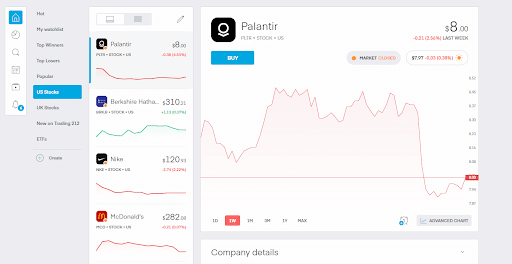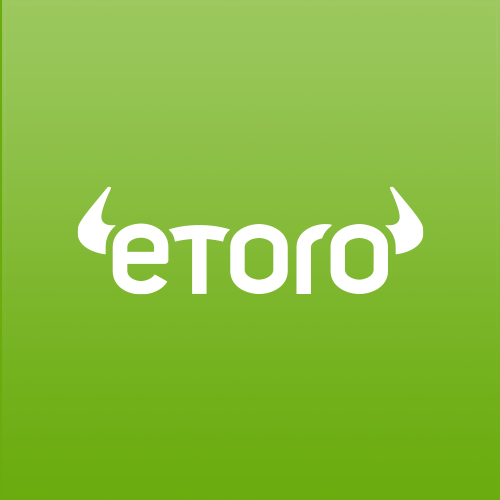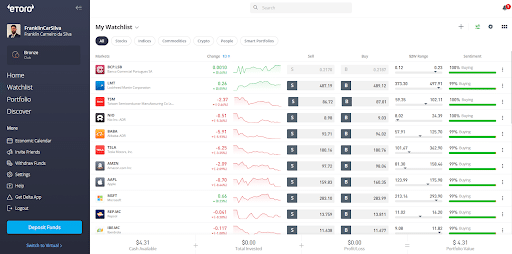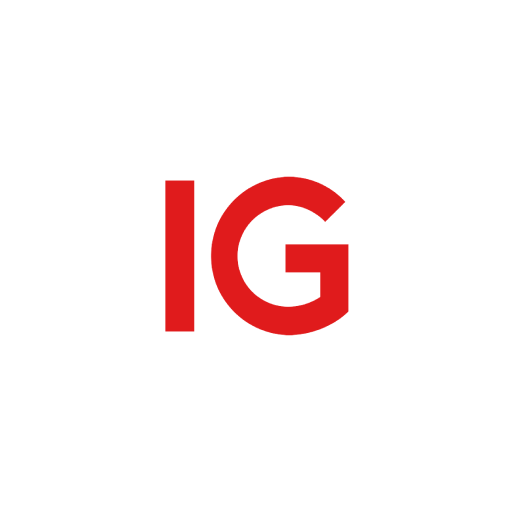Since its inception in 2016, Freetrade has built a reputation as a broker that enables trading with very low fees. Since it is based in the UK, it has frequently been called the “Robinhood of the UK.”
Other than stocks, the platform also offers ETFs, REITs, SPACs, and investment trust trading, all being commission-free (but other fees may apply). Some of the other features of the platform include:
- The option of ISA, SIPP, or GIA account types;
- Fractional shares;
- Return on uninvested cash;
- Advanced tools, such as automated order types, advanced stock fundamentals, etc.
However, keep in mind that not all of these features are available to all users. There are 3 distinct subscription plans to choose from (Basic, Standard, and Plus), each with a different offering. You can see the comparison between the plans here.
Although currently available only in the UK and Sweden, the platform plans to expand to more European markets in 2024. You can follow the latest news on this here.
Other cons of the platform include:
- Limited offer of financial products;
- Subpar graphs, portfolio tracking, research, and educational features;
- No web or desktop platform (except the beta version for Freetrade Plus users);
- No phone or 24/7 customer support (live chat is available);
- High currency conversion (FX) fees.
If the cons of the platform outweigh the pros for you, maybe it’s time to consider other platforms that can meet your investing needs in a better way. These are our top picks for Freetrade alternatives:
Best Freetrade Alternatives in 2024
Interactive Brokers | Best global broker overall
Founded in 1978, it is one of the world’s most trustworthy brokers. It offers a wide selection of financial products (stocks, bonds, ETFs, mutual funds, currencies, options, and futures) from more than 150 global markets at reasonable commissions and low currency exchange fees. Stocks and Shares ISA and SIPP accounts are also available.
Trading 212 | Best for commission-free stocks and ETFs
A simple and intuitive platform, commission-free stocks & ETFs trading, and fractional shares make Trading 212 ideal for beginner investors. Stocks and Shares ISA account is also available for UK residents.
eToro | Best for social and commission-free investing
Since being founded in 2007, eToro has amassed over 30 million users by offering commission-free stock and ETF investing (other fees apply). It also offers other financial products like cryptocurrencies, as well as an innovative social investing feature (copying and following other investors’ trades and portfolios).
Disclaimer: eToro is a multi-asset investment platform. The value of your investments may go up or down. Your capital is at risk.
Plus500 | Best for CFD trading
Plus500 is a multi-asset online broker that offers no commissions when trading CFDs in Indices, Forex, Commodities, Cryptocurrencies, Shares, Options, and ETFs. It also offers an account for those who want to invest in physical shares called Plus500 Invest.
Disclaimer: 82% of retail CFD accounts lose money.
Saxo Bank | Best for experienced traders
This Danish broker offers experienced traders access to exchanges worldwide. It has a wide financial product selection, including options, forex options, commodities, futures, etc. It is most suitable for advanced investors because of its relatively high fees. Stocks and Shares ISA and SIPP accounts are also available for UK residents.
IG | Best for forex trading
Being primarily CFD and forex broker, IG enables trading in shares, indices, commodities, futures, and ETF CFDs. A long track record (IG group established in 1974), being listed on the London Stock Exchange (index FTSE 250), and is regulated by multiple regulators make IG a well-renowned broker. ISA and SIPP accounts are also available for UK residents.
| Broker | Minimum deposit | Supported Products | Currency conversion fee | Available in | Trading fees (US stocks) |
| Interactive Brokers | £0 | Stocks, bonds, ETFs, mutual funds, currencies, options, and futures | 0.08-0.20 basis points x Trade Value per order ($1-$2)minimum per order) | Internationally (exceptions apply) | From $0.0005 (Tiered) to $0.005 (Fixed); Free to US investors |
| Trading 212 | £1 (£10 for bank transfers) | Stocks, ETFs (Trading 212 Invest), CFDs (Trading 212 CFD) | 0.15% (Invest account), 0.50% (CFD account) | Internationally (not available in the US, Canada, and some other countries) | Commission-free (other fees may apply) |
| eToro | $50 (varies across countries) | ETFs, stocks, cryptocurrencies, CFDs | Between 50 and 150 PIPs | Internationally (exceptions apply) | Commission-free (other fees may apply) |
| Plus500 | £100 (£500 for bank transfers) | Stocks (Plus500 Invest), CFDs (Plus500 CFD) | Spot rate ± 0.7% (Plus500 CFD) | Internationally – not available in the US and some other countries (Plus500 CFD) | 0.006$ per share – higher on other exchanges (Plus500 Invest) |
| Saxo Bank | £0 | Stocks, ETFs, bonds, currencies, futures, options, mutual funds, CFDs | 0.25% | Internationally (exceptions apply) | $1 minimum (Classic account) |
| IG | £0 (for bank transfers) | CFDs, forex, stocks, ETFs | 0.5% | Internationally (exceptions apply) | Commission-free (other fees may apply) |
#1 Interactive Brokers
Interactive Brokers at a glance
Having been around since 1978 and surviving multiple financial crises, the Interactive Brokers’ major advantage is its reputation. It is also publicly listed on the NASDAQ exchange (ticker: IBKR), making it a bit more regulated than other platforms.
Other significant advantages of using Interactive Brokers are its wide selection of financial products from over 150 markets, solid trade execution (IB SmartRouting), and supporting 24 currencies in its account. There are also 100+ currency pairs available for exchange.
Some downsides of using Interactive Brokers are:
- The complex fee structure;
- Lengthier than average registration and fund deposit processes;
- Limited commission-free trading (only available for US investors).
However, the last point is largely mitigated by using narrower spreads and lower FX fees than most of its competitors.
Speaking of the fee structure, there are two distinct plans to choose from – Tiered and Fixed, with the former fees depending on the trade volume. The fees also vary across different markets. You can see the full fee structure here.
There are 3 apps to choose from when accessing your account: Interactive Brokers Trader Workstation (TWS) desktop app, IBKR GlobalTrader mobile app, and Client Portal web-based app.
The Interactive Brokers Trader Workstation (TWS) app offers many basic and advanced features, such as a demo account, watch lists, alerts and monitoring in real-time, advanced technical analysis tools, and more. One of the downsides of the platform is that the learning curve can be steep for beginners, even with the provided educational materials.
The IBKR GlobalTrader mobile app is a much more intuitive choice for beginner investors, offering stocks, ETFs, and options trading in a more user-friendly format. Other app features include automatic currency conversions and fractional shares (only for certain US stocks).
There is also a web-based application named Client Portal, which is halfway between TWS and Global Trader in terms of user experience and available features. It offers some of the advanced trading tools of the TWS in a more user-friendly format.
Interactive Brokers Client Portal
Interactive Brokers also offers tax-favourable Self-Invested Personal Pension (SIPP), Stocks and Shares ISA, and Junior ISA accounts for UK residents.
Overall, Interactive Brokers is a good choice for beginners and advanced investors looking for a secure broker and access to a wide choice of financial products. If you need more info about it, feel free to check out our more detailed review of Interactive Brokers.
Pros
- Reputable, publicly listed, and well-regulated broker
- Wide choice of financial products and global markets
- Low commissions, currency exchange fees, and trading spreads
Cons
- Higher learning curve than some other platforms (partially fixed with IBKR GlobalTrader)
- More complicated account opening and fund depositing process than average
- Complicated fee structure
#2 Trading 212
Trading 212 at a glance
Founded in 2004, Trading 212 claims the title of the first-ever commission-free broker in both the U.K. and Europe. As of 2024, it has over 2 million users with over £3 billion in assets under management (AUM).
It offers two distinct account types: Trading 212 Invest, which offers commission-free stocks and ETFs trading, and Trading 212 CFD, which offers CFD trading only.
The Trading212 Invest account has been rapidly gaining popularity with beginner investors especially, and with good reasons:
- The minimum deposit is just £1 (£10 for bank transfers);
- Commission-free stocks and ETF trading is available (along with fractional shares);
- The platform is very simple to use (for both account opening and trading).
The account opening and fund depositing process is one of the simplest ones on the market. Trading is also easy and intuitive when using the platform, both on mobile and web-based apps. There are almost zero fees for the end user when depositing funds by bank transfer and trading stocks or ETFs.
It is important to note that Trading 212 can offer commission-free trading primarily due to its share lending program, which is mandatory for Trading 212 users. In a nutshell:
- Trading 212 holds the right to lend your shares to a third party (borrower);
- This doesn’t affect your ability to trade the shares, receive dividends, etc.
- Trading 212 has to always hold collateral in the form of US Treasury Bonds that is equal to or more than 102% of the value of the shares lent.
However, that doesn’t mean there are no fees on Trading 212. Some of the fees that Trading 212 charges are;
- 0.7% for deposits by cards, Google Pay, Apple Pay & other (it’s free up to the first €2,000);
- 0.15% (Trading 212 Invest) or 0.50% (Trading 212 CFD) currency exchange fees;
- Overnight fees on CFDs.
There may be some additional smaller fees applied by different exchanges or countries. You can see the fee structure in more detail here for Trading 212 Invest and here for Trading 212 CFD. Other cons of the platform include a limited offer of financial products, supporting only 3 base currencies (USD, EUR, and GBP), and high spreads on Forex CFDs.
Stocks and Shares ISA account is also available for UK residents at no extra fee.
For those of you who are thinking about joining Trading 212, you can even claim a free share when you sign up by following this link. After you verify your identity and fund the account, be sure to include promo code “IITW” to claim one free share worth up to £100.
To sum it all up, Trading 212 is a good choice for beginner investors who want a simple, effective, and cheap way to buy stocks and ETFs.
If you need more info, feel free to check out our more detailed review of Trading 212.
Pros
- Commission-free stocks and ETFs trading
- Intuitive and simple platform
- Free stock upon signup
Cons
- Limited offer of financial products
- Share lending
- Credit/debit card fee (after the first deposited €2,000)
#3 eToro
eToro at a glance
Being founded in 2007, regulated by top-tier financial institutions, and having over 30 million global users, eToro is a well-renowned broker. The platform is most known for its social trading feature, which you can use to follow and copy other investors’ trades and portfolios. There is also a wide selection of markets and financial products when investing by yourself, including stocks, ETFs, cryptocurrencies, and CFDs (on stocks, ETFs, commodities, currencies, indices, and cryptocurrencies).
The platform is intuitive and well-suited even for beginners and also offers trading with virtual funds through its demo account. Account opening and depositing funds are both easy and fast. Zero commission trading is available, and the minimum deposit is set at $50 (varies across countries).
eToro Dashboard
The feature that eToro is best known for is probably its social trading feature named Copy Trader. It allows users to copy the trading behaviour of other investors in real time at no extra charge to the user.
Another unique feature of eToro is an automated investing tool named Smart Portfolios. Most Smart Portfolios are created and managed by the eToro Investment Team. Still, Partner Portfolios are created and managed by eToro’s partners, which include asset managers, data research companies, and more.
Low and transparent fees are one of the main pros of using eToro. There are no fees for account management or when trading stocks. The most common fees are:
- Currency exchange fees when depositing in currencies other than the USD;
- A fixed withdrawal fee of $5 (minimum withdrawal amount is $30);
- $10 inactivity fee after 1 year;
- Market (bid/ask) spreads.
The most important cons when using eToro other than the mentioned fees are supporting only one currency for trading (USD) and having high spreads on certain products. Other cons include the lack of more advanced tools for experienced traders and the platform having custody over your crypto assets.
Overall, eToro is a good choice for most beginner investors looking for a simple and low-cost way to start investing through a reputable broker who offers access to a wide selection of financial products. Its innovative social and automated investing features could also be a way for many beginners to start their investing journey.
If you need more info, feel free to check out our more detailed review of eToro.
Pros
- Intuitive, easy-to-use, and beginner-friendly platform
- Low fees, including commission-free stock trading
- Innovative features such as social trading (CopyTrader), Smart Portfolios, etc.
Cons
- Only one currency is accepted for trading (USD)
- Withdrawal fee ($5)
- High spreads on certain products
#4 Plus500
Plus500 at a glance
Founded in 2008, Plus500 is a trading platform best known for its wide choice of CFD products and low fees in its Plus500 CFD account. However, it also offers stocks (physical shares) in the Plus500 Invest account.
The company is also listed on the London Stock Exchange and is available in over 50 countries. There are 16 different base currencies to choose from (including USD, EUR, and GBP, to name a few).
The web platform (WebTrader) offers an intuitive interface with access from multiple devices, including a mobile app. There is also a demo account option to test the features and trade with virtual funds.
Plus500 Dashboard
Plus500 CFD fees come mainly from the buy/sell (Bid/Ask) spreads, which vary widely across different financial products. When using Plus500 Invest, each trade has a fee, depending on the exchange you’re using. It could be as low as 0.006$ per share for US stocks but can be significantly higher for EU stocks (the minimum is between €2 and €6 per trade).
Keep in mind that there is also a currency conversion fee (up to 0.7% of the trade’s realized net profit and loss) and a $10 monthly inactivity fee (following three months of not logging in to the platform).
Find more detail about Plus500 CFD fees here and Plus500 Invest fees here. If you need more info about Plus500 in general, you can check out our detailed Plus500 review.
Pros
- Low fees and wide choice for CFD trading
- Available in 50+ countries and supports 16 different currencies
- Intuitive interface with a demo account option
Cons
- Primarily a CFD broker
- The inactivity fee
- Relatively high fees for non-US stocks and conversion fees
#5 Saxo Bank
Saxo Bank at a glance
Founded in 1992, Saxo Bank is one of the longest existing global brokers. It is known for its wide variety of financial products (over 60,000), access to a large number of market exchanges (over 120), and a large number of base currencies (18).
Saxo Bank has, more than anything, been trying to appeal to professional investors. It has done so by offering advanced tools, such as its integration with the Trading View charting platform. The apps SaxoTraderGO and SaxoTraderPRO have also been tailored to the professional user, both by the number of their features and their relative complexity.
Saxo Bank Dashboard
Those are probably some reasons why Saxo Bank has one of the highest initial deposit requirements in the industry. These can vary depending on your residency, starting from £0 for UK investors and €2,000 for most European countries. It is important to note that Saxo Bank is unavailable in some big global markets outside Europe, such as the US.
Three distinct account levels are available: Classic, Platinum (£200,000 minimum), and VIP (£1,000,000 minimum), each with its fee structure.
Speaking of fees, they are one of the biggest cons of using Saxo Bank. Fees for trading US stocks and ETFs start at just $1, but only for VIP accounts. These fees will be much higher for Platinum and Classic accounts, starting at $4 and $5, respectively.
The fee structure is fairly complex, and there are also some additional fees to be aware of. Just to name a few most common ones:
- Minimum monthly custody fee: £5;
- Inactivity fee (after not logging in for 6 months): £100;
- Currency conversion fees: between 0.45% and 0.75%.
It is probably best to select the desired financial product from their website to see its full fee structure.
In a nutshell, Saxo Bank is tailored to professional investors because of its advanced tools, higher-than-average fees, and complex interface. Those are also reasons why it may not be suitable for beginner or even intermediate investors.
Pros
- Very wide selection of financial products
- Extensive trading data and tools
- Reputable broker with a long track record
Cons
- Higher than average fees
- High minimum initial deposit
- Not available in most big markets outside Europe
6# IG
IG at a glance
IG is a well-renowned broker, offering a wide choice and low commissions in primarily CFD and Forex trading. The IG Group (established in 1974) is one of the most valuable UK public companies (included in the FTSE 250 index), has over 300,000 clients worldwide, and covers 18,000+ markets (varies based on your residency).
The user-friendly platform is available internationally (with some exceptions) and offers 6 base currencies: USD, GBP, AUD, EUR, SGD, and HKD. Suppose you are a resident of the UK (or its territories). In that case, you can also open a share dealing account which offers access to real shares, ETFs, and automated ETF portfolios (IG Smart Portfolio). You can find more info about it here.
However, most traders will be drawn to IG because of their CFD and Forex trading capabilities.
Some of the features of the platform include:
- Educational materials: videos, articles, webinars, guides, courses, and a dedicated mobile app;
- 24-hour-a-day support;
- Weekend trading and extended hours on shares, forex, and indices;
- Fast execution times;
- Access to Meta Trader 4 (a leading forex trading application);
- Advanced tools: customizable screener, recommended news based on your account…
They offer commission-free trading for most CFDs but charge their own spread on top of the market spread. Namely, spreads start at 0.6 points on key FX pairs, 0.8 points on major indices, and 0.1 points on commodities. The exception is share CFDs, which are offered at the real market price without added spread, but there is a commission when you open the position and again when you close it.
Other fees include:
- FX conversion fee of 0.5%;
- Overnight fees (depending on the product);
- Inactivity fee ($18 monthly after 2 years of inactivity);
- Custody fee for less than 3 quarterly trades on the share dealing account (£24).
You can learn more about their fees at this link.
Tax-favourable ISA and SIPP accounts are also available for UK residents. The SIPP account is offered in partnership with UK Options, an independent pension administration and trustee company, which charges a £210 yearly fee for the service. The ISA account can be opened for both the share dealing and Smart Portfolio accounts, with a custody fee of £24 charged per calendar quarter (if you have less than 3 trades per quarter).
In a nutshell, IG is a broker that primarily offers CFD and Forex trading in a user-friendly interface and with competitive fees. It is tailored to both beginner and advanced traders due to a mix of educational materials and advanced trading tools.
Pros
- User-friendly trading platform
- Competitive fees and spreads
- Additional features: 24 hours a day support, educational materials, extended trading hours, etc.
Cons
- High inactivity and share CFD fees
- Share dealing account available only to UK residents
- High fees for ISA and SIPP accounts
The bottom line
To summarize, here’s our list of Freetrade Alternatives:
| #1 | Interactive Brokers | Best global broker overall |
| #2 | Trading212 | Best for commission-free stocks and ETFs |
| #3 | eToro | Best for commission-free stock trading and social investing |
| #4 | Plus500 | Best for CFD trading |
| #5 | Saxo Bank | Best for experienced traders |
| #6 | IG | Best for forex trading |
Choosing a broker among numerous options can be a daunting task. The key is to choose a broker that best suits your investing needs because there is no such thing as one broker tailored to all customers. All of them have certain pros and cons which may be more or less important to you.
Hopefully, we made it easier for you to choose an alternative to Freetrade with this article.











